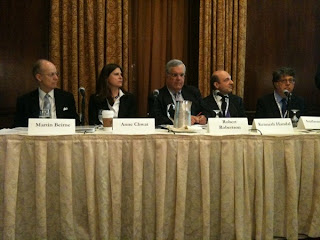Welcome to ILN-terviews, a series of profiles of ILN member firm attorneys, designed to give a unique insight into the lawyers who make up our Network.
For our latest interview, we chose ILN member,
Ricardo Cordero of
Cordero & Cordero Abogados in Costa Rica.
In one sentence, how would you describe your practice?
Our law firm is a general practice law firm specializing in corporate and business law.
Who would be your typical client?
International corporate clients and individuals doing business or investing in Costa Rica who require general assessment in areas such as corporate law, financial law, and insurance law, as well as real estate and development law. In addition, our firm also deals with issues related to civil litigation, labor and immigration law, competition and regulation, intellectual property, and telecom law.
What would you like clients and potential clients to know about you?
That our law firm has the sufficient experience and we are professionals with strong legal backgrounds and a set of standards that will help them to achieve their goals in Costa Rica, whether for a particular investment, transaction, or a long-term business. In addition, we work closely with all of our clients in order to make sure there is a sense of teamwork and co-participation.
What has been your most challenging case? Why?
Our most challenging cases have been a couple of international project finance facility projects that we have worked on during the past year. Due to the economic crisis, both lenders and borrowers are more cautious and the sources of funding have been very limited. Thus, we have had to go the extra mile and use a lot of legal creativity, long work hours, and careful strategy to be able to secure such transactions.
What has been your proudest moment as a lawyer?
I think I am living my proudest moment as a lawyer. Together with my firm's partners, we have managed to continue the expansion of our firm's practices, international clientele and exposure as one of the most renowned law firms in Costa Rica. I have also been able to achieve my personal goals as a professional and as co-managing partner of the firm.
What do you do when you're not practicing law?
During my spare time, I try to have a balance between my family, traveling and playing golf.
What would surprise people most about you?
My age.
What has been your most memorable ILN experience?
Since we recently joined the ILN, I would have to say that the most memorable ILN experience has been the Annual ILN Meeting held in San Francisco this past June. On a personal level, I was surprised by the good environment, which seems to be the common denominator for all ILN meetings. We were greeted very kindly by existing members. On a professional level, I was very impressed by the professionalism and reputation held by all ILN members.
What career would you have chosen if you weren't a lawyer?
I always knew I wanted to be a lawyer. However, if I had to choose another career, I probably would have chosen Business Administration/Entrepreneurship. I have always enjoyed the business side associated with the practice of law.
If a movie were made out of your life, who would you want to play you?
Tom Hanks. I think he is a great actor who has always chosen the parts he plays very well. In addition, he seems to be a down to earth, personable guy who lives his life working hard and close to his family.
How would you like to be remembered?
I would like to be remembered as someone who enjoyed life, his family and work; as someone who always tried to do things the right way in the pursuit of excellence. I would like to be remembered as someone affable, who passed on good moral values and the sense of hard work to my next generations.










